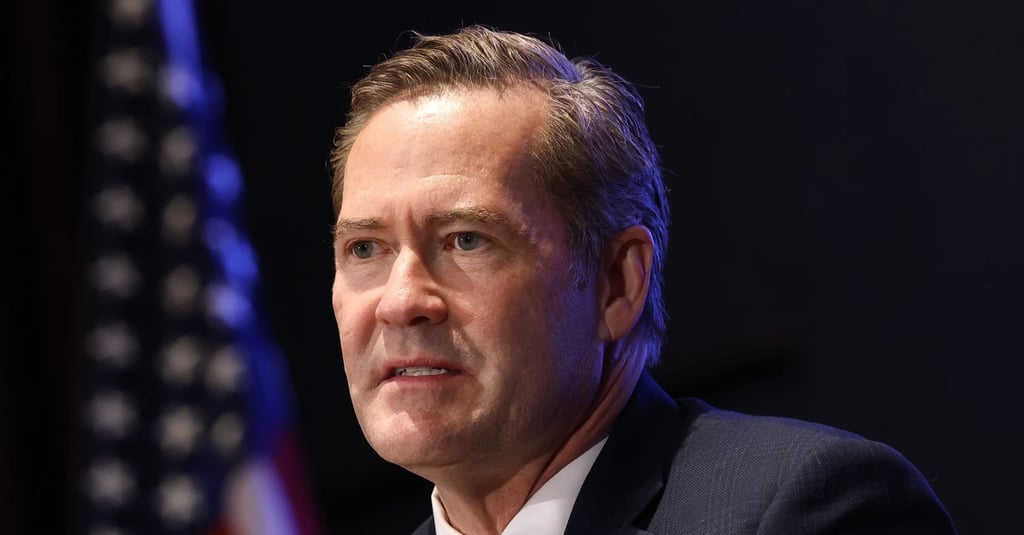Trump’s National Security Team Faces Disruption as Mike Waltz is Removed
President Donald Trump's national security team undergoes a shake-up with the removal of national security adviser Mike Waltz, further complicating an already tumultuous foreign policy landscape. This move signals a consolidation of power within Trump's inner circle, especially as global tensions continue to rise.
WORLDPOLITICS
AP
5/3/20252 min read


Trump’s National Security Team Faces Disruption as Mike Waltz is Removed
Introduction: A Disruptive Personnel Change
President Donald Trump’s decision to remove national security adviser Mike Waltz marks another shake-up within his national security team. The move follows scrutiny over the use of encrypted messaging for sensitive military operations and growing concerns about the leadership of Defense Secretary Pete Hegseth. The firing of a four-star general leading the National Security Agency further highlights internal turmoil.
Context of the Shake-Up: Foreign Policy at a Crossroads
The timing of Waltz’s ouster coincides with escalating foreign policy challenges, including Iran’s advancing nuclear program, a trade war with China, and ongoing conflicts in Gaza and Ukraine. These situations have proved more difficult for Trump to resolve than anticipated, despite his initial confidence in quickly settling both wars.
Consolidating Power in a Smaller Circle
Waltz’s removal provides Trump with the opportunity to centralize foreign policy decision-making within a smaller group of trusted advisers. By doing so, Trump may gain even more control over his administration’s foreign policy. Among those gaining influence is Secretary of State Marco Rubio, who, after initially clashing with Trump during the 2016 presidential campaign, has become a key ally.
Marco Rubio's Rise: From Rival to Key National Security Figure
Rubio’s transformation from Trump’s 2016 rival to an influential figure in his administration is notable. Once mocked as "Little Marco," Rubio has aligned himself with Trump’s foreign policy, leading efforts to overhaul the State Department while avoiding the pitfalls that ensnared Waltz. This shift has solidified Rubio's role as one of Trump's most trusted foreign policy voices.
Waltz's Criticisms and Challenges
Waltz faced intense criticism over his handling of classified information, including adding journalist Jeffrey Goldberg to a private text chain regarding a planned airstrike on Houthi militants in Yemen. His support for neoconservative policies, such as advocating for military interventions in Iraq, Syria, and Libya, also placed him at odds with the increasingly isolationist GOP.
Internal Chaos Within the Pentagon
Under Defense Secretary Pete Hegseth, the Pentagon has been rife with internal conflict, including the firing of senior military officers and top civilian advisers. These actions have been driven by leak allegations and policy missteps, including an edict to remove content celebrating diversity and reports of sensitive military information being leaked, further complicating national security operations.
A Lack of Coordination: Growing Concerns About Foreign Policy
Trump’s national security team has been criticized for a lack of coordination and consistency. Daniel Fried, a former U.S. ambassador, described the team as a “work in progress,” warning that the chaotic decision-making process threatens effective foreign policy. Critics believe these internal issues, combined with Trump’s unilateral decision-making approach, are undermining the administration's foreign policy.
Conclusion: A New Phase in Trump’s Foreign Policy
While Trump’s decision to remove Waltz may streamline his foreign policy decisions, it also raises questions about the long-term effectiveness of his administration's strategy. With key foreign policy issues like the wars in Ukraine and Gaza still unresolved, the concentration of power in Trump’s hands could either strengthen or further destabilize U.S. foreign policy moving forward.
Photo: Kevin Dietsch/Getty Images
MORE NEWS
© 2026. Ke Press Global. A Ke Harbor Company. All rights reserved.
FOLLOW KE PRESS GLOBAL ON :
Contact us


